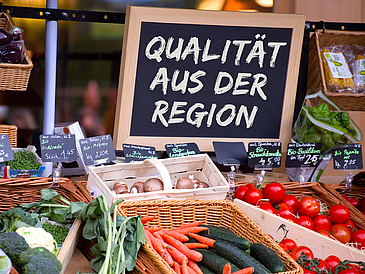In times of globalization and worldwide networking, sustainability plays a large role - including in our diet. “At our event we want to discover how much regionality can be found in Bremen and also show that small Bremen has much more to offer than initially assumed,” says Franziska Borowski, one of the student organizers. “We can build a connection to food in this globalized world by growing it ourselves. That is why we are particularly pleased that we have won over NABU (Nature And Biodiversity Conservation Union) to provide input on the topic of “native exotics,” states her fellow student Vanessa Hoffmann happily.
Video Production after Event
However, there will be more than just home growing: “Many of us, including us students, simply lack time and space,” explains Emre Altug. “That is why we will be presenting several no-packaging stores in Bremen,” states Sarah Kreuzer. Kristin Kokemoor adds: “Because the sustainability of our work is also important to us, we will produce a video that will still be available after the event.”
Seasonality is, of course, a focus when looking at regional food, highlights Andreas Koberstein. “That is why we are creating a calendar with a recipe for each month,” says Franziska Böhme. Marama Vogel adds: “It is harder than initially though when you try to offer vegetarian and vegan alternatives.” “However, the recipes are important in offering a specific starting point,” says Alicia Beem. The quiz “Wer isst denn sowas?” (“Who eats that?”) focuses on typical Bremen recipes. “Ever as a Bremen native, I was surprised by some ingredients and recipes,” admits Lea Ziegler and laughs.
Digital Event Created in Seminar
The event was created within the seminar “Digitale Veranstaltungen planen und durchführen” (“Planning and Realizing Digital Events”) - a seminar where students learn and apply the tools for event management. “As the Department of Anthropology and Cultural Research (IfEK) will host the German Anthropological Association (Deutsche Gesellschaft für Sozial- und Kulturanthropologie - DGSKA) conference in September, we focused on their conference topic - the Anthropocene - in our seminar,” states Marie-Helene Wichmann, who leads the seminar at the IfEK as a scientific assistant.
The Anthropocene is a period of time in which humans are the deciding factor for biological, geological, and atmospheric changes. The personal responsibility of each individual is closely connected to this. This is exactly what the students address with their event. By doing so, they are daring to try an entirely new type of knowledge transfer into society. “We sit for several hours a day every day in digital classes and wanted to therefore create a digital event to which one still wants to go to additionally,” says Maike Schuckenbrock. “It was clear to us that we want an interactive concept and the opportunity to communicate with participants.”
The workshop results and work created by students will be incorporated in the DGSKA conference promises Dr. Cordula Weißköppel, DGSKA press officer. As students can take part in the DGSKA conference, which has the title “Worlds. Zones. Atmospheres. Seismography of the Anthropocene” (Welten. Zonen. Atmosphären. Seismographien des Anthropozäns”, for free this year, this practical work offers them further insight and is a great addition to the scientific debates.
Students and members of the university can register for the event (Study group: “Richtig regional - Was Bremen alles zu bieten hat!”) on Stud.IP until July 2. All other interested parties are also welcome and can register for the online event by sending an email to m.wichmann@uni-bremen.de.
Contact:
Marie-Helene Wichmann
Department of Anthropology and Cultural Research
University of Bremen
Phone: +49 421 218-67617
Email: m.wichmannprotect me ?!uni-bremenprotect me ?!.de

